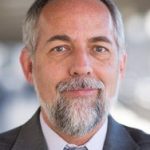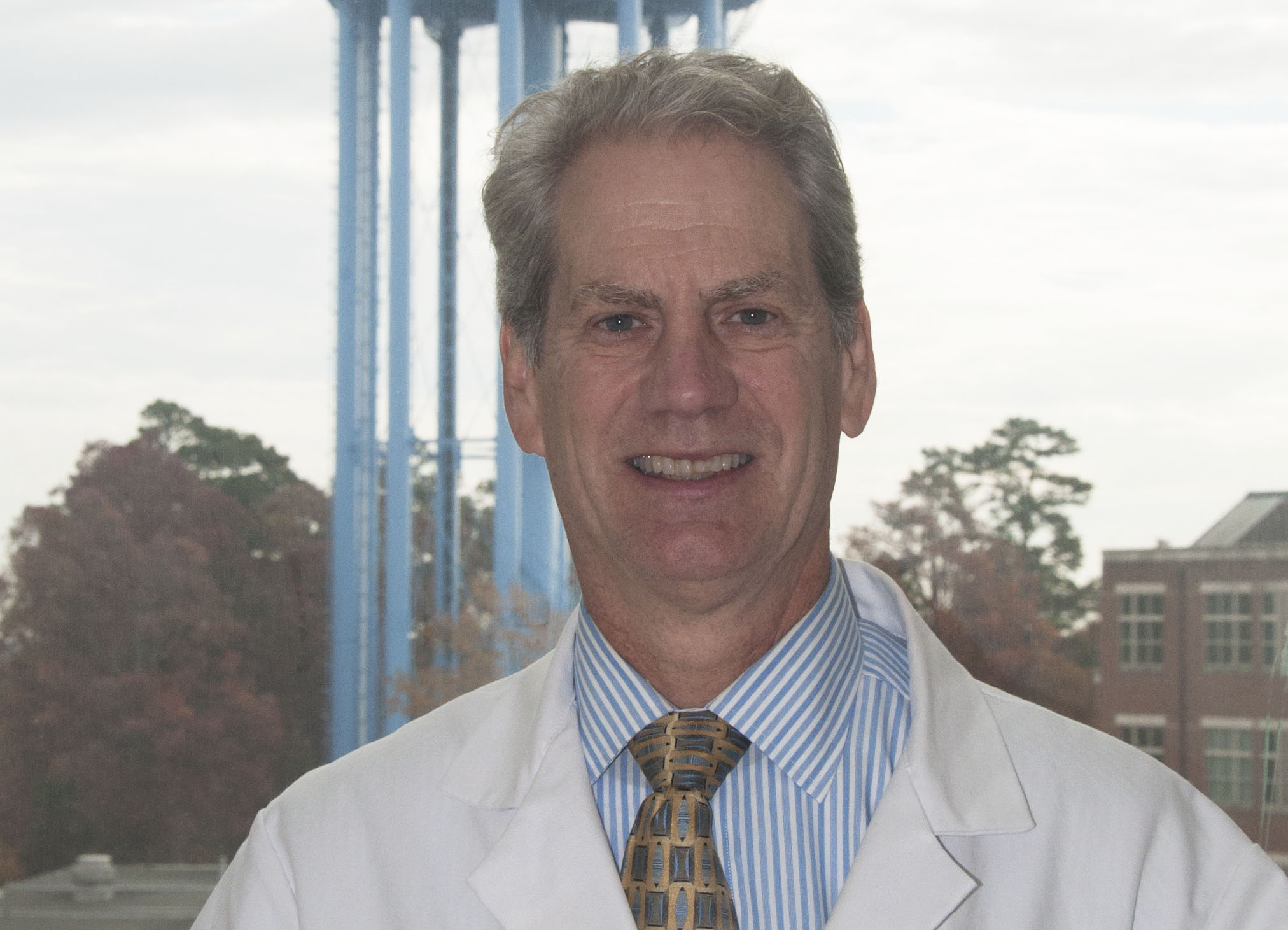Behind the Scenes — December 2018


From the Director of Telehealth
by Tim Poe
As I sit down to write, much of North Carolina is blanketed in snow. I hope that this newsletter finds each of you safe and warm.
I want to thank you for your support of the UNC Cancer Network over this past year. By the time the year closes, we will have provided twenty-four for-credit professional oncology lectures, along with four community college oncology lectures. For the first year ever, all of our lectures (with one exception) will be placed into our UNCCN Learning Portal (https://learn.unccn.org ) where clinicians and students may freely receive relevant certificates for completing available courses. We hope that you find this a welcome addition to our freely available live lectures.
In addition to facilitating oncology lectures, our team has supported hundreds of multi-disciplinary tumor boards and other oncology-related events. I want to thank our team members Mary King, Veneranda Obure, and Jon Powell for all of their efforts each and every day to provide first-class service to customers across our state. It is truly an honor to work with such a talented and dedicated team.
Looking to 2019, we are excited to be adding ACPE (pharmacy) credits, which began at the end of last month. I hope that you will help to spread the word to your colleagues who need pharmacy CEs. Please see Jon’s article for full details.
We will soon be announcing a full lecture lineup for 2019. We have put a great deal of thought into planning next year’s lectures, and we are very appreciative for all of the feedback that made this possible. We will be sending our new schedule in just a few weeks, and, of course, you may always visit our site at www.unccn.org to find our upcoming lectures, and many other details about our programs.
Wishing you and yours a peaceful holiday season, and a joyous New Year,
Tim
![]()

Interview with Wendell G. Yarbrough, MD, MMHC
by Mary E. King
In September of 2018, Wendell G. Yarbrough returned to UNC-Chapel Hill School of Medicine as the Thomas J. Dark Distinguished Professor and Chair of the Department of Otolaryngology/Head and Neck Surgery. I recently had the pleasure of interviewing Dr. Yarbrough about his return to UNC and his work.
Why did you decide to return to NC/UNC?
UNC has always been a dream job in otolaryngology/head and neck surgery. The faculty and staff are world-renowned, and the School of Medicine, university, centers, and other departments offer such a strong platform and support, that there was really no way I could not return.
What experiences in your life most motivated you to pursue your line of work?
My experiences during training, both on the clinical and research fronts, motivated me to pursue otolaryngology and cancer cell biology. It really comes down to the teachers and mentors who invested in and took an interest in my future. That was the biggest motivation. If I can shout out to clinical mentors Newton Fischer, Paul Biggers and current faculty Harold Pillsbury, Mark Weissler, and Bill Shockley on the clinical mentor side and Betty Wilson, Frank French, Ed Liu, and current faculty Yue Xiong and Shelley Earp on the research side.
What about your field of medicine excites you?
The innovation in surgery and reconstructive techniques, as well as scientific advancements that benefit our patients are what sustains me; but what really excites me is seeing our faculty leading these changes and translating them into real patient benefit.
What role do you see for video/technology in your work with head and neck cancer?
Otolaryngology has always been at the front of using technology for patient care, and I believe that this will continue to accelerate. We have moved more and more toward endoscopic and minimally invasive surgeries to provide more effective and less morbid care for patients, and we have embraced robotic advances to assist. I also see a huge opportunity for video/technology to advance medical education and care of patients in remote areas.
What do you believe to be some of the most pressing health issues in your field today and why?
There are many pressing head neck health issues including the relatively low rate of cure for patients with head and neck squamous cell carcinoma coupled with overtreatment of patients with good prognosis. At the heart of this problem is our current inability to determine which patients need which therapies. Our research team is currently working to create new therapies, as well as to use molecular characteristics of the tumor itself to better identify patients who need aggressive or less aggressive treatment.
What would you like our readers to know about you?
I really enjoy what I do and have never thought that showing up to take care of patients or contributing to research advances as work. I have a wonderfully supportive wife and family, and two less supportive dogs, and think that I have the best job that I can imagine.
![]()

Upcoming Events
by Jon Powell, PhD
Caring for Adolescents and Young Adults Living with Cancer: Meeting their Unique Medical and Psychosocial Needs RN and Allied Health Lecture
11/14/18 12:00 – 1:00 p.m.
Please join the UNC Cancer Network for an online telehealth lecture with Lauren Lux, LCSW. Adolescents and Young Adult living with cancer have unique medical and psychosocial needs. The recognition of these needs has created a new field of study in practice in the oncology world. As such many institutions are developing multidisciplinary teams to address AYA needs. However, you don’t need a huge budget or a new program to make an impact with this age group. We will establish the age specific needs of this group and discuss some simple changes to make in your day to day practice that will help you meet your AYA patients’ needs. — RN and Allied Health lectures offer FREE CNE and ASRT continuing education credit (upon approval) for eligible participants.
Caring for the Patient with Melanoma or Other Skin Cancers NC Community College Lecture
Please join the UNC Cancer Network for an online telehealth lecture with Frances Collichio, MD and Nancy Thomas, MD, PhD. This lecture will have two parts. The first part will focus on prevention and recognition of melanoma and it will be given by Dr Thomas. The second part will introduce the student to immuno-oncology and show how the concepts of that field apply to the medications that are used in advanced disease. We will do this through case presentations. — NC Community College Oncology lectures offer FREE Certificates of Participation (upon approval) for eligible participants.
Understanding and Treating Anxiety & Depression in Patients and Families with Cancer Medical and Surgical Oncology Lecture
11/28/18 12:00 – 1:00 p.m.
Please join the UNC Cancer Network for an online telehealth lecture with Eliza Park, MD. Depression and anxiety disorders commonly occur among patients with cancer and their family caregivers. This lecture focuses on the common symptoms and management strategies for depression and anxiety disorders in patients with cancer and their family members. — Medical and Surgical Oncology lectures offer FREE CNE, ASRT, and CME continuing education credit (upon approval) for eligible participants.
![]()

More Changes at the UNC Cancer Network
by Jon Powell, PhD
The UNC Cancer Network is making changes that we hope will help oncology professionals throughout North Carolina. We are adding ACPE continuing education (CE) credits to our Live Lectures and to the Learning Portal’s Self-Paced, Online Courses. Furthermore, our catalogs are going on the ARRT website.
Beginning with our November 28, 2018, Medical and Surgical Oncology Live Lecture, we have added ACPE CE credit to all of our lectures. ACPE CE credits are available to both pharmacists and pharmacy technologists. This addition expands our customary offerings beyond CME, CNE, and ASRT CE credits. When these Live Lectures with ACPE CE credits make their way into our Learning Portal, these Self-Paced, Online Courses will also have ACPE CE credit.
The UNC Cancer Network is also in the process of adding our catalog of RN and Allied Health and Medical and Surgical Oncology lectures to the ARRT website. ARRT, the organization that offers credentials and approves CE credits for radiologic technologists, is creating a system that helps its members locate lectures with which they can earn CE credits. This system will also review the types of CE credits that radiologic technologists have already earned and will suggest other programs that will round out the individual’s needs.
![]()

New Additions to the Learning Portal
by Jon Powell, PhD
The UNC Cancer Network’s Learning Portal (learn.unccn.org) offers FREE CME, CNE, and ASRT continuing education credits for oncology professionals through our self-paced, online courses. We recruit UNC faculty and other oncology professionals to deliver lectures on the latest treatments, clinical trials, and supportive services available to North Carolina cancer patients.
Paul Armistead, MD, PhD
Immunotherapy 101
https://learn.unccn.org/online-course-catalog/rn-and-allied-health-courses/“
This lecture will review the mechanisms by which the immune system controls both infections and cancer, as well as strategies cancers have for evading effective immune responses and progression. The lecture will also discuss the different types of currently available cancer immunotherapy treatments, their mechanisms of action and their potential side effects.
Simon Khagi, MD
Tumor Treating Fields for Glioblastoma
https://learn.unccn.org/online-course-catalog/medical-and-surgical-oncology-courses/
Glioblastoma is a devastating disease with a survival that is measured in months. The recent FDA approval of the Optune device for the treatment of newly-diagnosed glioblastoma was a paradigm shift in the field of neuro-oncology. We will focus our discussion on the biological underpinnings of this device and clinical data supporting its use.